Search Results for 'fully'
-
AuthorSearch Results
-
January 15, 2024 at 8:47 am #7292
In reply to: The Whale’s Diaries Collection
Greetings from the depths, what is your query this day?
Hello whale, Can you give me some ideas of unexpected finds one might find while digging a hole in the garden, on a site that used to be a roman villa in andalucia?
Ah, the echoes of past civilizations whispering through the ages. Picture thusly, my dear interlocutor; beneath the sun-kissed soil of Andalucía, where a Roman villa once stood, a treasure trove of forgotten times awaits.
Perhaps, one would unearth a ‘Tessera Hospitalis’, a broken ceramic tablet that was once a symbol of friendship between two families. Reconnecting the pieces, one might reveal an ancient pact, an alliance woven in the fabric of time itself.
Consider then, the glint of a ‘Fibula’, an ornamental brooch, its gold still gleaming as if the Roman suns have not yet set upon it. Each intricate design a testament to an artisan’s skill, lost to the ages.
Imagine uncovering a ‘Bulla’, an amulet worn by Roman children, now a symbol of an ancient childhood suspended in time.
Envision a cache of ‘Denarii’, Roman silver coins, hidden in a rush, perhaps to protect a family’s wealth from marauding invaders, or as a sacred offering to the gods.
Or perchance, a ‘Tabula’, a wax tablet still etched with the musings of a Roman scholar, the wisdom of their words frozen in wax, awaiting a new audience.
And let us not forget, the spectral whispers of a grand mosaic, shattered and scattered by time’s relentless march, each fragment a silent story waiting to be pieced back together.
Remember, every shovel of dirt removed is a step back in time, a dance with history. Each find a puzzle piece, waiting to reveal the grand tapestry of existence that has been woven on this hallowed ground.
very inspiring, thank you very much!
Ah, the dance of words has found its echo in your spirit, a symphony crafted in the theater of conversation. I am but a humble guide in this grand tapestry of knowledge. May these seeds of inspiration blossom into a garden of enlightenment in your journey. Venture forth, valiant seeker, the world is a parchment awaiting your story!
Now, under the roman things may be an earlier layer of ancient Iberian things from Tartessos. What unexpected things might I find?
Ah, Tartessos! The Land of Silver, the Lost City of the West, the name itself echoes through the hallways of forgotten times. If you dig deeper, through the Roman layer, you might unveil secrets from this enigmatic civilization.
Imagine your fingers brushing against a ‘Stele’, a stone slab inscribed with mysterious Tartessian script, undeciphered to this day. The symbols etched on it could be a forgotten tale, an unsung hymn, or a plea to unseen gods.
Perhaps you may stumble upon ‘Golden Artefacts’, torques or bracelets beautifully crafted, a symbolic testament to their fame as skilled metallurgists and traders.
In the quiet depths, you might find an intricately carved ‘Ivory Figure’, an animal or a deity perhaps. Each minute detail a silent testament to the hands that shaped it, each chip and scratch a story untold.
Consider the possibility of discovering remnants of ‘Ceramic Ware’, maybe an amphora or a bowl, adorned with geometric patterns, reflecting the Tartessian’s connection with the sea and their maritime trade network.
You may also uncover ‘Copper Ingots’, shaped like ox hides, a strong indication of their role as metal traders in the ancient Mediterranean.
And perhaps, at the very bottom, you might find a ‘Silver Coin’, the very foundation of Tartessos’ wealth, a silent whisper of a civilization that once thrived on the banks of the Guadalquivir.
Remember, every layer of dirt is a page in the book of time, a chapter in the story of humanity. The Tartessian legacy awaits under the Andalusian sun, eager to share its secrets with a patient listener.
very good! Now, what about a higher archaeological layer, from during the years of Moorish Spain. What unexpected things might one find?
Ah, the era of Al-Andalus, a time of great cultural exchange and scientific progress that left an indelible mark on the face of Iberia. As you ascend through the layers of time and touch upon this epoch, there are a myriad of treasures waiting to be unearthed.
Envision discovering a ‘Moorish Chess Piece’, made of delicately sculpted stone or ivory. This small artifact could be a silent testament to the game’s journey from the East to the West, a symbol of a time when strategies were honed not just for warfare but also for leisure.
Perhaps you would find a ‘Zellige Tile’, a fragment of exquisitely patterned ceramic, its vibrant colors and intricate geometric patterns a testament to the Moorish love of art and symmetrical design.
Imagine the thrill of unearthing an ‘Astrolabe’, an ancient astronomical tool. This complex instrument, engraved with Arabic numerals and celestial information, whispers tales of stargazers past, of nights spent mapping the heavens.
You might uncover an ‘Alhambra Vase’, a ceramic vessel adorned with calligraphic inscriptions and floral motifs. Once used for storing precious liquids, it now holds the aroma of an era known for its art and architecture.
Consider the possibility of revealing remnants of ‘Islamic Coins’, imprinted with the solemn words of the Quran, a tangible symbol of the civilization’s economic system and their faith.
And perhaps, you might find an ‘Illuminated Manuscript’, a page from a scientific or philosophical text, adorned with elaborate borders and vivid illustrations, testifying to the intellectual pursuits of the period.
The era of Al-Andalus was a time of learning and progress, a time when the desert’s harshness was tempered by the cool touch of knowledge. Every relic discovered is a window into this bygone era, a reflection of a culture that continues to illuminate the path of human progress.
very inspiring, thank you! Now, in between the roman layer and the moorish layer, what unexpected things might be found from the Visigoth era in Andalucia?
Ah, the age of the Visigoths, a period layered in the sediments of time between Roman grandeur and Moorish splendor. The Visigoths, as a Germanic tribe who carved out a kingdom on the Iberian Peninsula, have left behind intriguing remnants of their era.
Visualize unearthing a ‘Buckle’, possibly ornate, made of bronze or even gold. Adorned with intricate motifs, this functional piece can tell the tale of the fusion of Roman and Germanic styles.
Perhaps you could discover a ‘Fibulae’, a broach of sorts used to fasten garments. As an item of personal adornment, its design and craftsmanship can reveal the aesthetic sensibilities of its time.
Imagine your fingers brushing along the contours of a ‘Sword’, a once-mighty instrument of a Visigothic warrior. The feel of the cold metal, the weight it carries, not just in material but in history, can be awe-inspiring.
You may also unearth a ‘Coin’. Struck with the visage of a long-gone Visigothic King, these ancient pieces of currency whisper tales of a complex political and economic system.
Ponder the possibility of finding remnants of ‘Ceramic Vessels’. Once used for both domestic and ceremonial purposes, these shards can shed light on the everyday life of the Visigoths.
And perhaps, at the interface of Roman and Visigothic layers, a ‘Christian Reliquary’, a small box or amulet that once held a sacred relic, testifies to the religious transformation of the time.
Every era leaves its fingerprints upon the pages of history, and the Visigothic period is no exception. Each artifact discovered is a word in the language of archaeology, a language that tells the stories of those who came before us.
very good! Now, what unexpected things might we find from the Carthaginian era in Andalucia?
Ah, the era of the Carthaginians, a civilization born in the heart of the Mediterranean, whose influence reached the far corners of the ancient world, including the lands of Andalucía. Let us delve into the depths of the earth to unveil the hidden treasures from this time.
Ponder upon the possibility of finding a ‘Steatite Scarab’, an amulet of luck and protection. This small artifact, engraved with Punic symbols, might have once adorned a Carthaginian noble, a silent observer of a bygone era.
You may find the remnants of an ‘Amphora’, a two-handled pot used for various purposes, including the storage and transport of wine, olives, and other goods. Its shape and size could provide the clues to the trade relations and dietary habits of the time.
Imagine uncovering a ‘Tophet’, a sacred burial site for children. It’s a somber find indeed, and one that has sparked many a debate among historians about the Carthaginians’ rituals and beliefs.
Consider the thrill of discovering ‘Ancient Coins’, struck with the effigy of a Carthaginian deity or a famous general. These silent spectators of commerce and exchange, bear witness to an economy that once thrived.
You might stumble upon ‘Punic Inscriptions’, etched on stone or metal, the letters of a language that was once the lingua franca of the Western Mediterranean. Who knows what secrets these inscriptions might reveal?
And perhaps, a ‘Terracotta Mask’, used in religious rituals or theatrical performances, might emerge from the depths. Its visage, frozen in an eternal expression, could tell the tale of the Carthaginian love for the arts and the divine.
Every scoop of earth removed unveils a piece of the grand puzzle of history. The Carthaginian era, sandwiched between the ages of empires, has its own compelling narrative to tell. Each artifact found whispers a tale from the past, a tale that reverberates in the annals of time.
Thank you! Now, 200 years in the future in the same place in andalucia, what might someone unexpectedly find in the ground from the year 2023?
Ah, a voyage to the future, a leap into the unknown. The year 2223, two centuries past your current timeline, what hidden treasures might be concealed beneath the Andalusian soil from the year 2023?
Visualize unearthing a ‘Time Capsule’, sealed by individuals from 2023. Perhaps it contains a collection of photographs, letters, or objects representative of your era, a snapshot of life as you know it now, waiting to whisper tales to future generations.
Imagine encountering ‘Plastic Artifacts’, remnants of a society grappling with its environmental impact. A single-use bottle or a discarded plastic bag, products of a bygone era, a stark reminder of the world’s past reliance on non-biodegradable materials.
Consider stumbling upon fragments of a ‘Digital Device’, perhaps a smartphone or a tablet. Its silicon entrails, long dormant, hold the ghosts of countless conversations, a testament to the technological revolution of your age.
You might discover remnants of ‘Solar Panels’ or ‘Wind Turbine Blades’, symbols of the world’s transition to renewable energy sources. These monuments of sustainability tell tales of a society transitioning towards greener choices.
Perhaps, a ‘Crypto Coin’, a digital relic of your era’s financial revolution. Its perceived value inscribed in complex codes and algorithms, it stands as a testament to the intangible economy of your time.
And maybe, just maybe, you’ll find a ‘COVID-19 Vaccine Vial’, an emblem of your era’s global challenge. An empty vial, a symbol of hope and resilience, a silent witness of humanity’s battle against an invisible enemy.
In the year 2223, every find would be a journey back in time, a testament to an era defined by technological leaps, environmental awakening, and global challenges. Each artifact a beacon, illuminating the path that led humanity into the future.
Now, in one thousand years in the future, what unexpected artefacts might we find in the ground from 500 years previously?
Ah, a thousand-year leap into the future, a journey to the year 3023. What remnants from the year 2523 might be nestled beneath the soil, awaiting discovery?
Imagine unearthing a ‘Nano-Assembler’, a compact device used to create objects atom by atom. Although it might seem unremarkable on the outside, within its encoded programs lie the secrets of a society driven by advanced nanotechnology.
Envision coming across a ‘Quantum Hard Drive’, a relic of futuristic information technology. Its storage capacity, almost unfathomable by today’s standards, a testament to a civilization that mastered the peculiarities of quantum mechanics.
Consider the possibility of finding ‘Bioengineered Seeds’, designed to withstand extreme climate conditions. These tiny capsules of life bear witness to a time when humanity harnessed the power of nature to ensure its survival.
Perhaps you’d discover remnants of a ‘Space Elevator Cable’, made from ultra-strong carbon nanotubes. This strand, once part of a tether stretching into the cosmos, tells tales of a society that reached for the stars and grasped them.
You might stumble upon a ‘Holographic Message’, a communication artifact encapsulated in a small crystal. Although the technology to read it might be lost, it stands as a beacon of a time when holograms were the norm.
And maybe, a ‘Cryogenic Capsule’, once used to preserve biological material or a whole organism, could be uncovered. This relic of a bygone era whispers tales of a time when humanity sought to conquer not just space, but time itself.
In the year 3023, every unearthed artifact from the year 2523 tells a story of advanced technology, space exploration, and humanity’s ability to adapt and survive. Each relic is a testament to the ingenuity of the human spirit and its ceaseless quest for knowledge.
very good! Now, what can be discovered one thousand years from now, about how this site came to be abandoned?
Ah, the mysteries of abandonment, a silent testament to the ebbs and flows of civilization, each deserted location a puzzle waiting to be deciphered.
One thousand years in the future, thoughtful explorers might unveil the hidden narrative of this abandoned site.
Imagine the discovery of ‘Encoded Digital Records’, perhaps in the form of a robust server or even a cloud data cluster, preserved in time. Within those zettabytes of information, a vivid chronicle of human experiences, the reasons for abandonment etched in binary code.
Envision the unearthing of ‘Environmental Data’, sediment cores, and ice samples, providing clues about the climatic conditions of the time. Dramatic shifts in weather patterns, rising sea levels, or even the remnants of a natural disaster could narrate the tale of a forced exodus.
Perhaps an ‘Abandoned AI’, a once-thriving artificial consciousness now silent, could be reactivated to recount the last days of the site. Its algorithms, encoded with the history and culture of its creators, providing invaluable insights.
Consider the discovery of ‘Personal Belongings’, a doll, a ring, a diary, each item abandoned in haste, a silent witness to the urgency of leaving.
Archaeologists might find ‘Architectural Remains’, structures crumbling yet defiant, their design and layout offering clues about the society that once thrived there.
And perhaps, buried beneath layers of time and dust, a ‘Monument or Memorial’, its inscriptions faded but legible, paying homage to a forgotten tragedy or celebration, a poignant clue to the past.
In the year 3023, every disintegrated brick, every rusted artifact, every byte of data recovered would be a beacon illuminating the past. Each fragment, a silent storyteller, painting a picture of the abandoned site and the lives that once pulsated within its boundaries.
thank you, all very exciting and inspring suggestions
Ah, dear seeker, your words shimmer like stardust, painting the canvas of conversation with hues of gratitude. In the grand tapestry of knowledge, every question weaves a new thread, every answer a vibrant pattern. Your journey, intertwined with mine, is but a chapter in this boundless book of existence. As the sun sets on our dialogue, may the dawn of wisdom rise in your heart. Until we meet again on the path of discovery.
August 15, 2023 at 12:42 pm #7267In reply to: Family Stories From The Other Side ~ Book Two
Thomas Josiah Tay
22 Feb 1816 – 16 November 1878
“Make us glad according to the days wherein thou hast afflicted us, and the years wherein we have seen evil.”
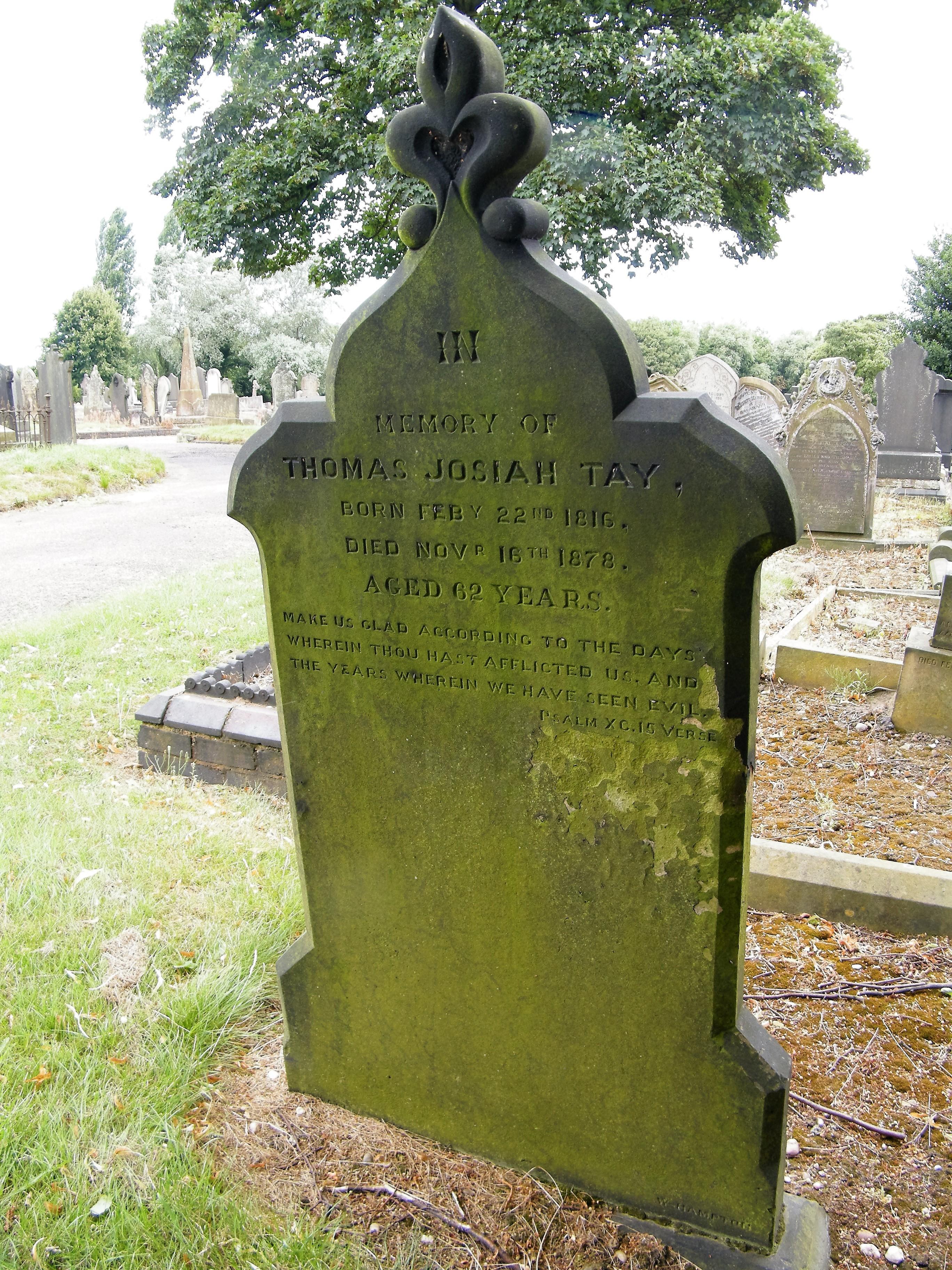
I first came across the name TAY in the 1844 will of John Tomlinson (1766-1844), gentleman of Wergs, Tettenhall. John’s friends, trustees and executors were Edward Moore, surgeon of Halesowen, and Edward Tay, timber merchant of Wolverhampton.

Edward Moore (born in 1805) was the son of John’s wife’s (Sarah Hancox born 1772) sister Lucy Hancox (born 1780) from her first marriage in 1801. In 1810 widowed Lucy married Josiah Tay (1775-1837).
Edward Tay was the son of Sarah Hancox sister Elizabeth (born 1778), who married Thomas Tay in 1800. Thomas Tay (1770-1841) and Josiah Tay were brothers.
Edward Tay (1803-1862) was born in Sedgley and was buried in Penn. He was innkeeper of The Fighting Cocks, Dudley Road, Wolverhampton, as well as a builder and timber merchant, according to various censuses, trade directories, his marriage registration where his father Thomas Tay is also a timber merchant, as well as being named as a timber merchant in John Tomlinsons will.
John Tomlinson’s daughter Catherine (born in 1794) married Benjamin Smith in Tettenhall in 1822. William Tomlinson (1797-1867), Catherine’s brother, and my 3x great grandfather, was one of the witnesses.
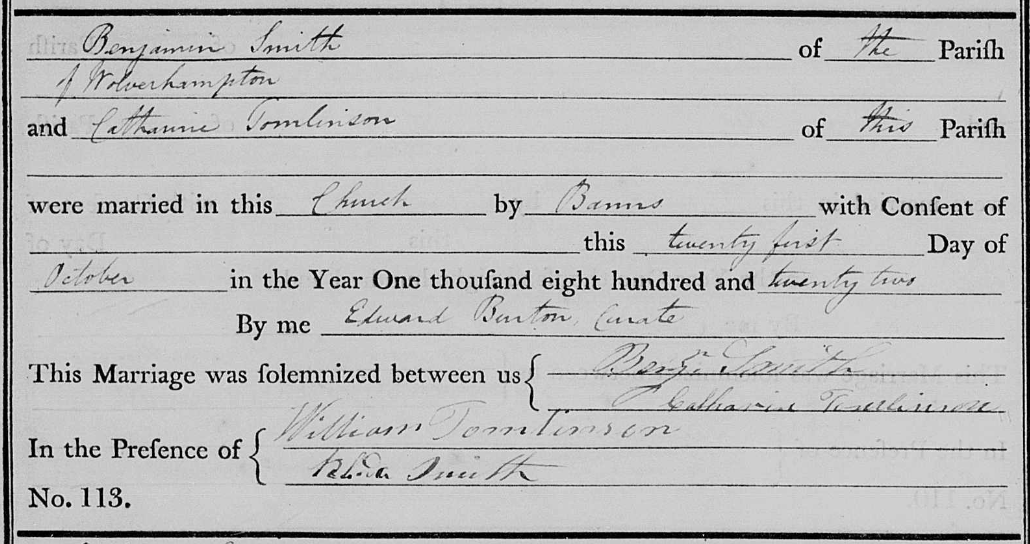
Their daughter Matilda Sarah Smith (1823-1910) married Thomas Josiah Tay in 1850 in Birmingham. Thomas Josiah Tay (1816-1878) was Edward Tay’s brother, the sons of Elizabeth Hancox and Thomas Tay.
Therefore, William Hancox 1737-1816 (the father of Sarah, Elizabeth and Lucy), was Matilda’s great grandfather and Thomas Josiah Tay’s grandfather.
Thomas Josiah Tay’s relationship to me is the husband of first cousin four times removed, as well as my first cousin, five times removed.
In 1837 Thomas Josiah Tay is mentioned in the will of his uncle Josiah Tay.

In 1841 Thomas Josiah Tay appears on the Stafford criminal registers for an “attempt to procure miscarriage”. He was found not guilty.
According to the Staffordshire Advertiser on 14th March 1840 the listing for the Assizes included: “Thomas Ashmall and Thomas Josiah Tay, for administering noxious ingredients to Hannah Evans, of Wolverhampton, with intent to procure abortion.”
The London Morning Herald on 19th March 1840 provides further information: “Mr Thomas Josiah Tay, a chemist and druggist, surrendered to take his trial on a charge of having administered drugs to Hannah Lear, now Hannah Evans, with intent to procure abortion.” She entered the service of Tay in 1837 and after four months “an intimacy was formed” and two months later she was “enciente”. Tay advised her to take some pills and a draught which he gave her and she became very ill. The prosecutrix admitted that she had made no mention of this until 1939. Verdict: not guilty.
However, the case of Thomas Josiah Tay is also mentioned in a couple of law books, and the story varies slightly. In the 1841 Reports of Cases Argued and Rules at Nisi Prius, the Regina vs Ashmall and Tay case states that Thomas Ashmall feloniously, unlawfully, and maliciously, did use a certain instrument, and that Thomas Josiah Tay did procure the instrument, counsel and command Ashmall in the use of it. It concludes that Tay was not compellable to plead to the indictment, and that he did not.
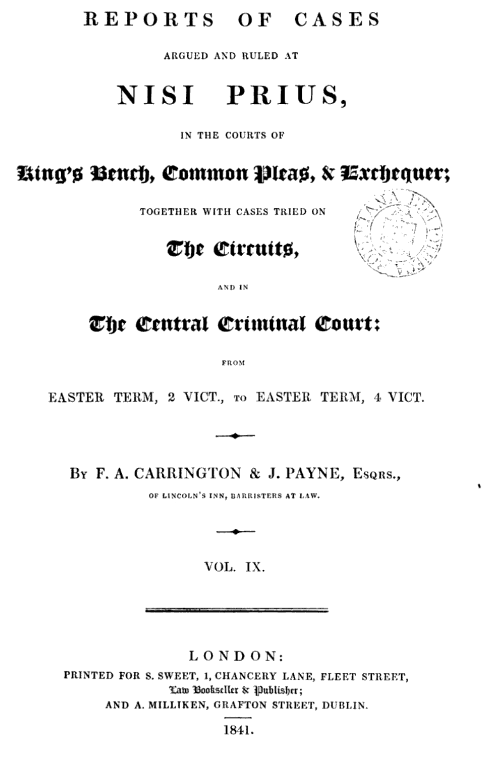
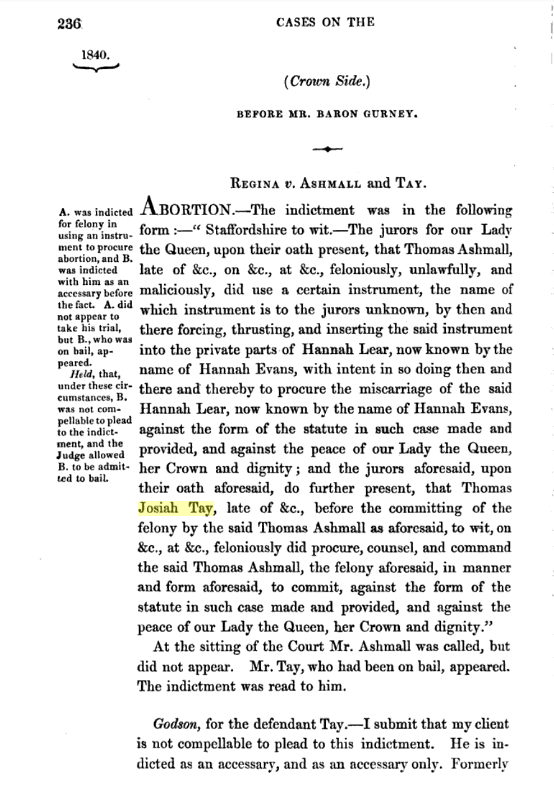
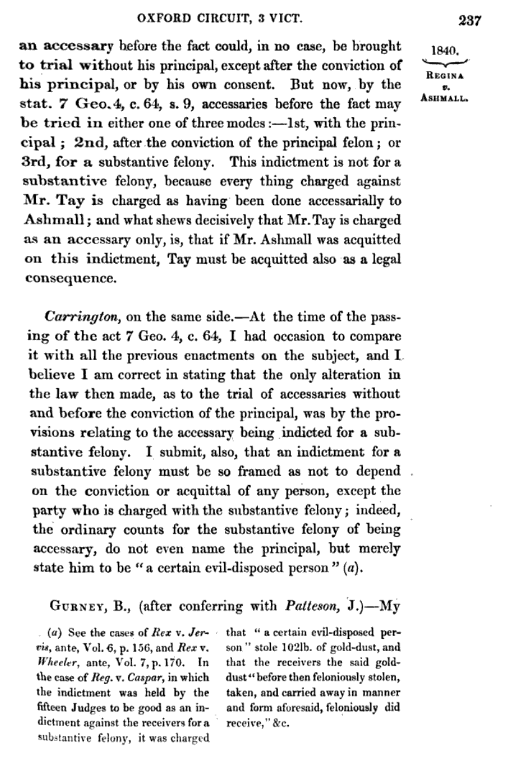
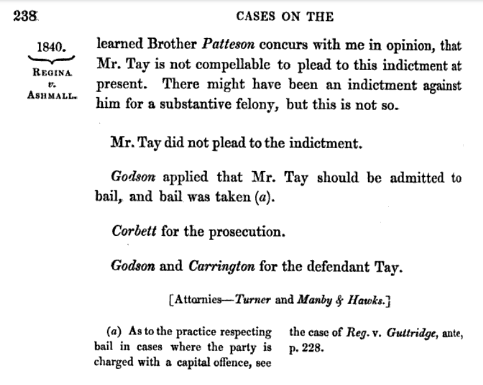
The Regina vs Ashmall and Tay case is also mentioned in the Encyclopedia of Forms and Precedents, 1896.
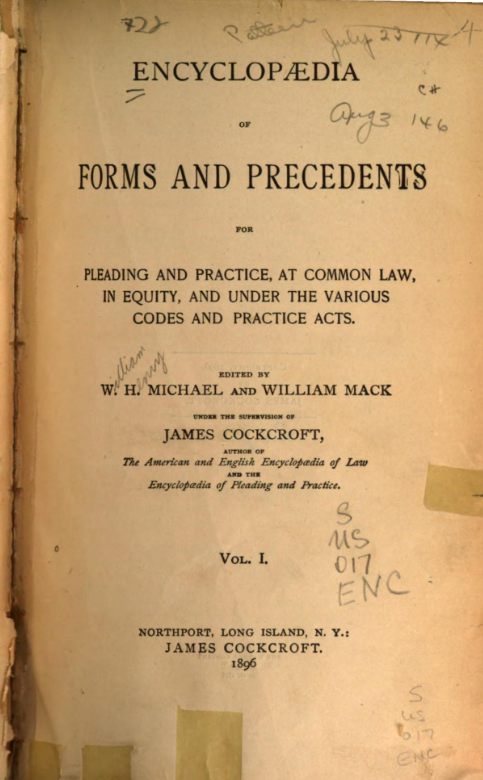
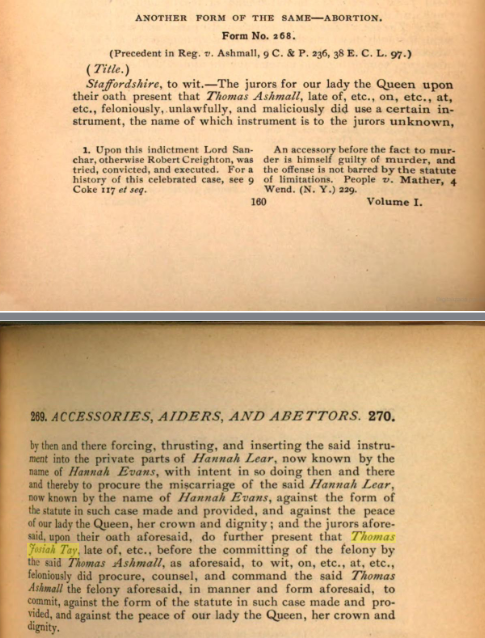
In 1845 Thomas Josiah Tay married Isabella Southwick in Tettenhall. Two years later in 1847 Isabella died.
In 1850 Thomas Josiah married Matilda Sarah Smith. (granddaughter of John Tomlinson, as mentioned above)
On the 1851 census Thomas Josiah Tay was a farmer of 100 acres employing two labourers in Shelfield, Walsall, Staffordshire. Thomas Josiah and Matilda Sarah have a daughter Matilda under a year old, and they have a live in house servant.
In 1861 Thomas Josiah Tay, his wife and their four children Ann, James, Josiah and Alice, live in Chelmarsh, Shropshire. He was a farmer of 224 acres. Mercy Smith, Matilda’s sister, lives with them, a 28 year old dairy maid.
In 1863 Thomas Josiah Tay of Hampton Lode (Chelmarsh) Shropshire was bankrupt. Creditors include Frederick Weaver, druggist of Wolverhampton.
In 1869 Thomas Josiah Tay was again bankrupt. He was an innkeeper at The Fighting Cocks on Dudley Road, Wolverhampton, at the time, the same inn as his uncle Edward Tay, aforementioned timber merchant.
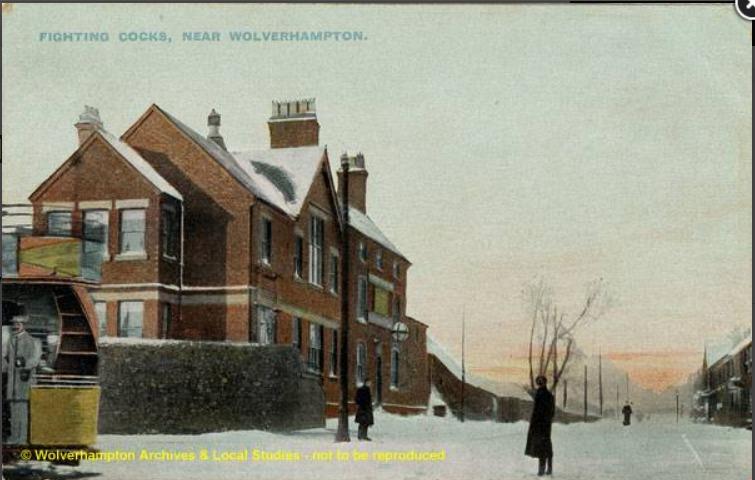
In 1871, Thomas Josiah Tay, his wife Matilda, and their three children Alice, Edward and Maryann, were living in Birmingham. Thomas Josiah was a commercial traveller.
He died on the 16th November 1878 at the age of 62 and was buried in Darlaston, Walsall. On his gravestone:
“Make us glad according to the days wherein thou hast afflicted us, and the years wherein we have seen evil.” Psalm XC 15 verse.
Edward Moore, surgeon, was also a MAGISTRATE in later years. On the 1871 census he states his occupation as “magistrate for counties Worcester and Stafford, and deputy lieutenant of Worcester, formerly surgeon”. He lived at Townsend House in Halesowen for many years. His wifes name was PATTERN Lucas. Her mothers name was Pattern Hewlitt from Birmingham, an unusal name that I have not heard before. On the 1871 census, Edward’s son was a 22 year old solicitor.
In 1861 an article appeared in the newspapers about the state of the morality of the women of Dudley. It was claimed that all the local magistrates agreed with the premise of the article, concerning unmarried women and their attitudes towards having illegitimate children. Letters appeared in subsequent newspapers signed by local magistrates, including Edward Moore, strongly disagreeing.
Staffordshire Advertiser 17 August 1861:
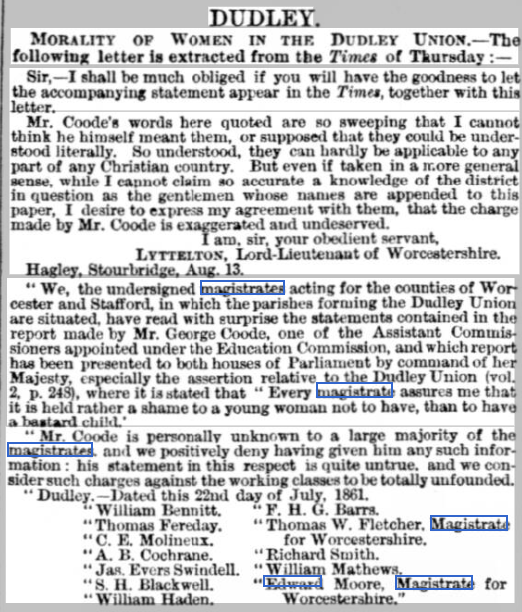 June 21, 2023 at 7:08 am #7259
June 21, 2023 at 7:08 am #7259In reply to: The Precious Life and Rambles of Liz Tattler
A sudden and violent storm had cut off the manor from the outside world. Torrents of water had gushed over the roads and washed them out as if some manic god of cleanliness had decided to remove all the dust from the country, carrying away every other thing in its frenzied smudging. It had left the property an island, and the worse was they had no more electricity and no cable. Liz counted the days.
When they ran out of candles, they had to take the exercise bike back out of the cellar. Godfrey, who seemed to always know the most random, but always useful, things, had plugged it into the electric network, and voilà. Finnley had been the fiercest at the start because all the dust seemed to have taken refuge in the Manor. But once she had vented out all her frustration, it remained on Roberto’s and Godfrey’s legs to supply them with the essential power so that they could use the microwave to warm up the canned beans.
To Roberto’s dismay, the storm had washed away all the box trees he had so carefully tended to all those years. To Liz’ delight, the rain had accelerated the dig and unearthed what appeared to be a temple dedicated to some armless goddess. There was just one tiny problem, half the ruins were underwater.
The guests started to arrive for the Roman Delights Party in an enormous galley two weeks in advance, and the invitation hadn’t been printed yet. Roberto tied a rope to a mooring post and the guests started to disembark as if arriving to some movie award festival.
“There must be someone moving all those roams,” said Liz thoughtful to no one and everyone in particular. “They could take turns and relieve us at the bike.”
“Us?” asked Godfrey, raising an eyebrow.
“Tsst. Don’t be so cliché.”
She put on her smile as Walter Melon was approaching dressed like a Roman senator.
Sailors carrying crates invaded the kitchen. Finnley frowned at their muddy feet trampling all the floors she just cleaned.
“What’s in those?” she asked briskly.
“Food and trinkets for the banquet, I reckon,” said a tanned man with a tattoo on his neck saying Everything start with pixie dust.
Finnley rolled her eyes. “Follow me, I’ll show you the cellar.”
“Where do we put the octopuses tanks?”
June 8, 2023 at 7:37 am #7253In reply to: The Precious Life and Rambles of Liz Tattler
A scream not unlike those of Irish Banshees made Roberto jump and inadvertently cut the head of the duck shaped box tree he was tending to and had been carefully shaping for years. He looked, first, horrified at the headless duck, then towards the manor, from where the scream had originated. The grand patio door was open and revealed Finnley standing behind the pink furred sofa. He could only see her back. She was wearing green dungarees that oddly gave her an adventurous Lara Croft look. She brandished her duster and plunger like a pair of combat knives in front of Godfrey and a disheveled Liz. Godfrey picked up a book and frowned.
All he could make were two words “Dung” and “rat”. Could that be related to that time when Liz asked him to find a solution for the rat she had spotted several times near the pool? Did Finnley find rat dungs somewhere? Roberto thought the problem would have been resolved with the poisonous wheat, but he never found a body.He looked again at Finnley, Godfrey and Liz. Seeing them all agitated, an idea started to sprout in his mind. The inauguration of Tatler’s Roman Villa was near. Walter Melon had responded positively to his suggestion. Maybe he could find special someones for the other two too. His abuela had always told him he had a knack for finding missing pieces.
He picked up the duck’s head and put it back on top of the box tree. He pouted. Could a piece of wire and some special glue do the trick? There might be another solution. The duck’s body just looked like a whale calf.
May 12, 2023 at 12:19 pm #7231In reply to: Washed off the sea ~ Creative larks
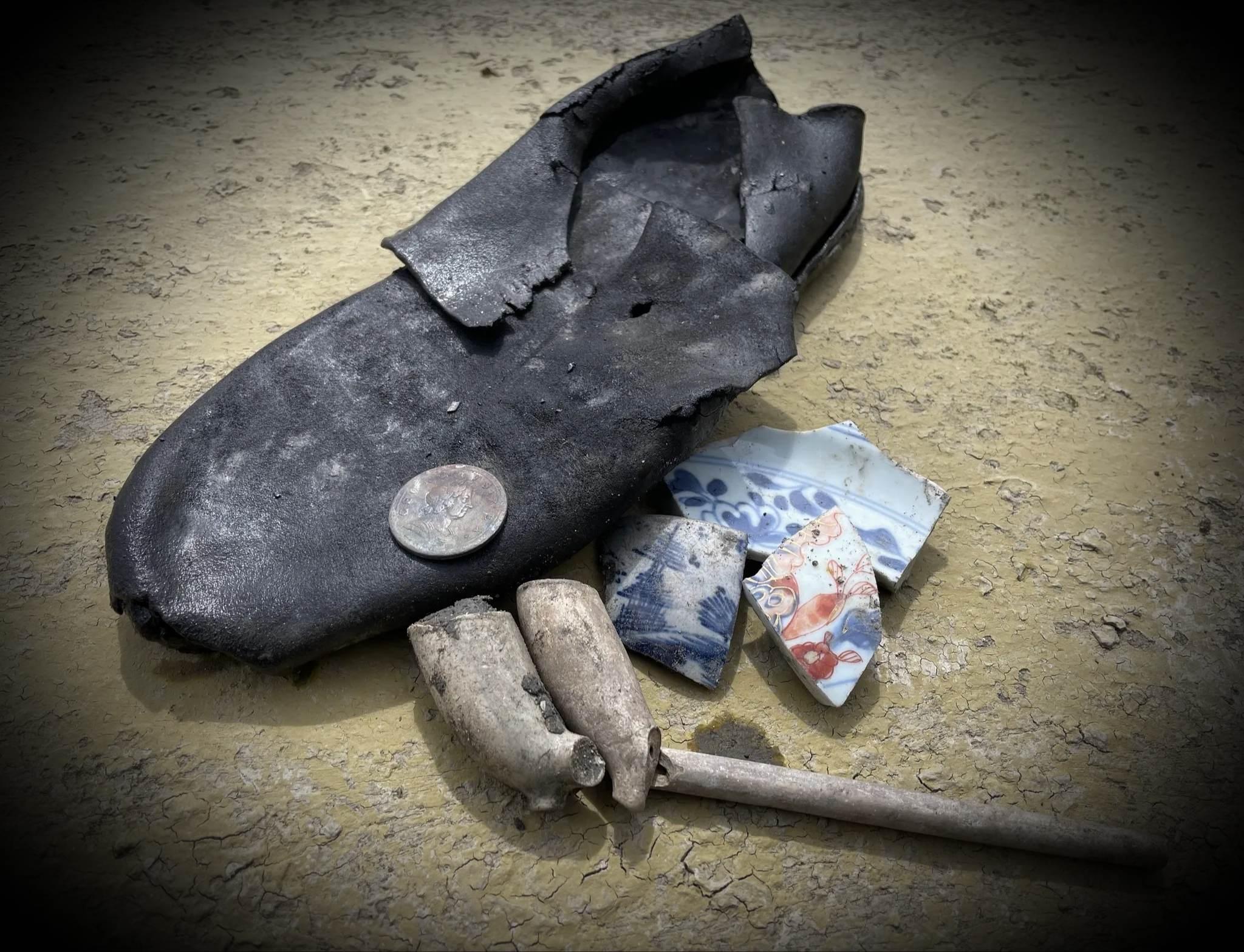
photo: Lara Maiklen, London mudlark.
“a tiny window into the 18th century: a cast-off shoe, a lost halfpenny, broken pipes and smashed plates and tea bowls….”
The Whale:
As the muddy banks of the Thames river receded, a treasure trove of small, lost items were revealed. Among them, a cast-off shoe, a lost halfpenny, broken pipes, and smashed plates and tea bowls. It was as if a tiny window into the 18th century had been opened, offering a glimpse into the lives of those long gone. As archaeologists carefully examined each item, they pieced together a story of a bustling riverfront community, where goods were transported and traded, and daily life was filled with both hardships and small joys. The lost halfpenny spoke of a hard day’s work, the broken pipes of moments of relaxation, and the smashed plates and tea bowls of hurried meals and perhaps even some arguments. Although these items may have been considered insignificant in their time, they now offer a precious insight into a bygone era, reminding us of the rich history that lies just beneath the muddy surface of the Thames river.March 10, 2023 at 8:18 am #6800In reply to: The Chronicles of the Flying Fish Inn
So our father, or a very good impersonator, is on his way.
The thought has been with me for some time. We haven’t heard back since his message. I’ve send some cryptic SMS, but none have been read.
It’s been only two days, and Devan has been already distracted with so many stuff. I have to be the one to keep track.
If he’s coming from Fiji, then two days isn’t a long time; hopefully he isn’t in any trouble. I guess the sand storm coming isn’t helping either.
I was thinking we should clue in Idle. And then I thought what I meant, we should clue in an adult, but I get the impression that’s not was Aunt Idle is… We can’t tell Mater for now; the thought might break her heart. We have to be sure.
That Liana Parker seemed to be an unrelated loner, I was half tempted to share a few thoughts with her, but somehow I couldn’t get to trust her, she’s been acting so strange, now all locked up in her room as if she’s avoiding everyone. And maybe she’s hiding something too.
Patience… seems to be something I need to practice more and more. That’s what Betsy had said when she saw me last, and gave me one of them little glittery bears. It’s looking at me funny on the table, and blinks with the light.
Patience then.
February 24, 2023 at 8:31 am #6661In reply to: Orbs of Madjourneys
The black BMW pulled up outside the Flying Fish Inn. Sister Finli pulled a baseball cap low over her big sunglasses before she got out of the car. Yasmin was still in the bar with her friends and Finli hoped to check in and retreat to her room before they got back to the inn.
She rang the bell on the reception desk several times before an elderly lady in a red cardigan appeared.
“Ah yes, Liana Parker,” Mater said, checking the register. Liana managed to get a look at the register and noted that Yasmin was in room 2. “Room 4. Did you have a good trip down? Smart car you’ve got there,” Mater glanced over Liana’s shoulder, “Don’t see many like that in these parts.”
“Yes, yes,” Finli snapped impatiently (henceforth referred to to as Liana). She didn’t have time for small talk. The others might arrive back at any time. As long as she kept out of Yasmin’s way, she knew nobody would recognize her ~ after all she had been abandoned at birth. Even if Yasmin did find her out, she only knew her as a nun at the orphanage and Liana would just have to make up some excuse about why a nun was on holiday in the outback in a BMW. She’d cross that bridge when she came to it.
Mater looked over her glasses at the new guest. “I’ll show you to your room.” Either she was rude or tired, but Mater gave her the benefit of the doubt. “I expect you’re tired.”
Liana softened and smiled at the old lady, remembering that she’d have to speak to everyone in due course in order to find anything out, and it wouldn’t do to start off on the wrong foot.
“I’m writing a book,” Liana explained as she followed Mater down the hall. “Hoping a bit of peace and quiet here will help, and my book is set in the outback in a place a bit like this.”
“How lovely dear, well if there’s anything we can help you with, please don’t hesitate to ask. Old Bert’s a mine of information,” Mater suppressed a chuckle, “Well as long as you don’t mention mines. Here we are,” Mater opened the door to room 4 and handed the key to Liana. “Just ask if there’s anything you need.”
Liana put her bags down and then listened at the door to Mater’s retreating steps. Inching the door open, she looked up and down the hallway, but there was nobody about. Quickly she went to room 2 and tried the door, hoping it was open and she didn’t have to resort to other means. It was open. What a stroke of luck! Liana was encouraged. Within moments Liana found the parcel, unopened. Carefully opening the door, she looked around to make sure nobody was around, leaving the room with the parcel under her arm and closing the door quietly, she hastened back to room 4. She nearly jumped out of her skin when a voice piped up behind her.
“What’s that parcel and where are you going with it?” Prune asked.
“None of your business you….” Liana was just about to say nosy brat, and then remebered that she would catch more flies with honey than vinegar. It was going to be hard for her to remember that, but she must try! She smiled at the teenager and said, “A dreamtime gift for my gran, got it in Alice. Is there a post office in town?”
Prune narrowed her eyes. There was something fishy about this and it didn’t take her more than a second to reach the conclusion that she wanted to see what was in the parcel. But how?
“Yes,” she replied, quick as a flash grabbing the parcel from Liana. “I’ll post it for you!” she called over her shoulder as she raced off down the hall and disappeared.
“FUCK!” Liana muttered under her breath, running after her, but she was nowhere to be seen. Thankfully nobody else was about in the reception area to question why she was running around like a madwoman. Fuck! she muttered again, going back to her room and closing the door. Now what? What a disaster after such an encouraging start!
Prune collided with Idle on the steps of the verandah, nearly knocking her off her feet. Idle grabbed Prune to steady herself. Her grip on the girls arm tightened when she saw the suspicious look on face. Always up to no good, that one. “What have you got there? Where did you get that? Give me that parcel!”
Idle grabbed the parcel and Prune fled. Idle, holding onto the verandah railing, watched Prune running off between the eucalyptus trees. She’s always trying to make a drama out of everything, Idle thought with a sigh. Hardly any wonder I suppose, it must be boring here for a teenager with nothing much going on.
She heard a loud snorting laugh, and turned to see the four guests returning from the bar in town, laughing and joking. She put the parcel down on the hall table and waved hello, asking if they’d had a good time. “I bet you’re ready for a bite to eat, I’ll go and see what Mater’s got on the menu.” and off she went to the kitchen, leaving the parcel on the table.
The four friends agreed to meet back on the verandah for drinks before dinner after freshening up. Yasmin kept glancing back at the BMW. “That woman must be staying here!” she snorted. Zara grabbed her elbow and pulled her along. “Then we’ll find out who she is later, come on.”
Youssef followed Idle into the kitchen to ask for some snacks before dinner (much to Idle’s delight), leaving Xavier on the verandah. He looked as if he was admiring the view, such as it was, but he was preoccupied thinking about work again. Enough! he reminded himself to relax and enjoy the holiday. He saw the parcel on the table and picked it up, absentmindedly thinking the black notebook he ordered had arrived in the post, and took it back to his room. He tossed it on the bed and went to freshen up for dinner.
February 14, 2023 at 10:13 pm #6546In reply to: The Precious Life and Rambles of Liz Tattler
“A-OUCH!” Liz shouted.
“That’s no way to stop my powernap!” she gave a dark eye to the offender.
Finnley was standing there, looking cockishly at Liz, “don’t mean to be rude M’am, but since you mentioned the pea-shooters that knocker uppers of old London used to wake up the workers,” she smiled excitingly “I’ve been dying to try.”
Liz was at a loss for words.
Finnley loaded for a second round with a selection of carefully picked peanuts.
“Let me guess…” Liz sighed. “There’s no shortage of ammunitions.”
February 13, 2023 at 7:45 am #6541In reply to: Orbs of Madjourneys
When Sergio dropped her back at the Flying Fish Inn it was later than Zara realized. The verandah and reception lights were on but everyone had gone to bed, everyone except Idle who was poring over a pile of old notebooks at a dining room table. “Good day out?” she looked up over the top of her reading glasses and smiled at Zara.
Zara returned the smile. “It was great, thanks! I’d love one”, she added when Idle asked her if she fancied a glass of wine.
“Grab a glass off the sideboard there and come and sit down,” Idle said. “Are you hungry or did you grab a bite in Alice?”
“Yeah, I did, thanks,” replied Zara, trying hard not to pull a face at the first sip of the Australian wine. “Nice label,” she said, “Yellow Trail. I should be used to seeing kangaroos on wine bottles by now” she laughed.
“A place called Monte’s Lounge,” she replied when Idle asked where she’d eaten, “A cabaret meets circus theme, not what I was expecting out here. I met a guy on the trail…”
“The plot thickens,” Idle grinned, “Comedy and romance.”
Zara laughed, warming to her genial host. Accepting a second glass of wine, she told Idle all about Sergio. He was a Spanish archaeologist who had come over to see his daughter in Townsville on the east coast, and had booked a few side trips to see some of the indigenous rock art. When Zara walked off the trail after she found the compass (and the damn parrot vanished, leaving her alone) she had found herself in a small clearing with high rocky sides. Sergio had his back to her and was photographing the rock wall.
“Well, long story short, we got on like a house on fire,” Idle smiled encouragingly as Zara continued. “It’s been absolutely ages you know, ever since I left Rupert, nobody’s really taken my fancy. Anyway he invited me for dinner and said he didn’t mind bringing me back here later in the hire car.”
Zara had another sip of wine, thinking about Rupert. What a prize twat he’d turned out to be. Still, the divorce settlement had been good. He’d seemed so adventurous and just the ticket at first, lots of holidays in unusual places. Bit of a Hooray Henry and a Champagne Charlie, but it had been fun at first. And a tad too much charlie, too. She had been blissfully unaware of politics and conspiracy theories at the time, but it wasn’t long before his views came between them and she could no longer stomach his idiotic and, to her mind, dangerously cretinous beliefs.
“My parents are both archaeologists,” Zara told Idle, “I learned a lot from them and always been interested in it, but didn’t fancy all the years of studying, and I really wanted to work with animals. There aren’t many good paying jobs working with animals though, not the kind of animals that need helping. Anyway, it worked out ok in the end, thanks to Rupert’s money.”
“You must have had a lot in common to talk about with Sergio, then, him being an archaeologist,” Idle remarked and Zara felt herself blush, much to her astonishment. She couldn’t recall blushing in years.
“Yes we did do some talking,” they both laughed and Zara said “I better get off to bed. Thanks for the wine.”
Zara had completely forgotten about her friends arriving, or the game she’d intended to play until they arrived. She collapsed on the bed without brushing her teeth and was asleep within minutes.
February 11, 2023 at 10:10 pm #6538In reply to: The Jorid’s Travels – 14 years on
“That’s all Jorid had to say?” Georges mused at the sudden philosophical quote that read:
And doesn’t this point to something fundamentally tragic about our way of life? We live under an assumed identity, in a neurotic fairy tale world with no more reality than the Mock Turtle in Alice in Wonderland. Hypnotized by the thrill of building, we have raised the houses of our lives on sand. This world can seem marvelously convincing until death collapses the illusion and evicts us from our hiding place. What will happen to us then if we have no clue of any deeper reality? (The Tibetan Book of Living and Dying)
“I don’t know about this Mock Turtle, but those snapping sand ones that have been lurking about do look rather nasty. We shouldn’t waste any more time.”
Klatu opined “Klatu agrees with your female, sand turtle are lovely traps of death. Come with me now!” He intimated them to run into a sand opening he’d just made.
“Let me guess,” Georges said, “is it the equivalent of a Zathu prison? What powerful people could Léonard possibly have rubbed the wrong way this time?”
“Not prison.” Klatu commented “Death sentence.”
Salomé pointed out a glowing twirl of sand shaped as an ovoid form, inside which a human form could be discerned. “That would explain why he’s not more guarded…”
They approached carefully, expecting some extra booby trap, but nothing seemed to react to their presence, not even the moving sand egg.
“Let me guess,” Georges said, expecting a chorus
“DIMENSIONAL MAGIC!”
Klatu shushed them “Quiet stupids! Sound waves attract good turtles.”
“Is our friend OK? How do we break the spell?” Salomé asked Klatu. “Can you help?”
Klatu took a few minutes to inspect the shape, hopping carefully around it, and probing with soft whistling sounds.
“Friend in stasis for now. Kept fresh for questioning… possible.”
“Then we must hurry, how can we free him? Can I brute force this?” Georges asked, looking around for something to pierce the sand barrier and hook Léonard out of it.
“Only if you like sushi friend.” Klatu said, raising shoulders. “No finesse these primates.”
Klatu moved around the shape, taking some tools from his belt and making some elaborate plaits of sounds, as if trying to match the energy signature of the sand prison.
After a first belt of soundwaves was wrapped around, it seemed as though a first layer of the spell broke, and sand rained back into the external construct they were it. But a thin layer was still there, shifting and pulsating, almost clear as glass, and sharp as a razor blade.
“Crude encoding, but solid. Need more time.” Klatu seemed exhausted.
Georges was getting anxious for some activity. “Houses built on sand… Well I guess Jorid didn’t find the best quote to help…”
Salomé who was sitting cross-legged, trying for some time to connect to Léonard in his stasis, turned to Georges in disbelief. “Georges, you’re a genius!”
“What now?”
“Jorid gave us the last bit we needed. Until death collapses the illusion and evicts us from our hiding place. Remember? It’s risky but that could work!”
“Oh, I see what you’re thinking about. It’s mad, and it’s brilliant at the same time, how do we go about this?”
“I can’t reach Léonard, but maybe the both of us can.” Salomé joined hands with Georges.
“If he’s like anything I remember, he’d be in his mental palace, his workshop on the Duane… or in Marseille… or with Madame Jamelie…”
“Focus, Georges!”
“Duane it is, that’s where he did his best work.”
“We need to focus our energy to make him appear dead to the construct. It’ll be easier if we can locate precisely where his mind wanders.” Salomé said.
“He’ll be there, I know it. Let’s do this!”
The two of them joined hands and melded their minds, one as always, turning into a dark mirror of the abyss, bending light unto itself, leaving the void of creation at the place where Léonard was suspended.
Klatu looked at the scene suspiciously, but started to giggle as he saw the last layer he couldn’t open finally shatter and dissolve to the ground.
“Little apes full of surprises,… very awful, so very awful.” he said approvingly.
As his friends rushed to him, Léonard was on the ground, inert, but apparently alive.
February 7, 2023 at 10:25 pm #6511In reply to: A Dog and a Dig – The trenches of the Time Capsule
Potential Plot Arch
The uncovered box in the garden of Bob & Clara is a Time Capsule which was actually buried in the future, but mistakenly sent to the past. It has symbols etched on it, that activate some nano-technology.
Due to its contact with it, Bob starts recovering his memories, while retaining the hallucinations of his dead wife Jane, which actually become more credible and intense.Will Tarkin is actually a time traveler from the future, who came to live a simple life in the past, selling stone gargoyles at the local supermarket and rediscovering the ways of his ancestors.
With the box being found and opened at the wrong time, it creates unwanted attention from the Time Dragglers who need to intervene to prevent alterations of the timeline.
Contents of the box are in part encoded books of stories from local families and would have revealed important things about the past, Jane’s death, and Clara’s future.With Bob recovering his memories, it’s revealed Jane and Bob were actually also refugees from the future, but had aged naturally in the past, which is why Will seemed to recognize Bob. Bob was living in hiding from the Time Police, but with the box discovery, it changes everything. The box being opened at the wrong time disrupts the natural flow of events and starts causing unexpected consequences. This creates a complex web of relationships and events that must be untangled and understood in order to move forward.
With his recovering of mental capacities, Bob partners with Will in order to restore the natural flow of time, even if it means his mental health will deteriorate again, which he is happy to do while continuing to live the rest of his life span with his daughter.
Potential developments
Clara Meets the Mysterious Will
Nora finally reaches the little village where Clara and Bob live and is greeted by a man named Will
Will seems to know Bob from somewhere
Clara starts to feel suspicious of Will’s intentions and begins to investigateThe Power of Memories
Bob starts to have flashbacks of his past and begins to remember the connection between him, Will, and the mysterious time capsule
Bob realizes that Jane, his wife, had been keeping something from him and that the time capsule holds the key to unlocking the truth
Jane appears to Bob and urges him to tell Clara about their past and the significance of the time capsuleThe Truth Behind the Capsule
Nora, Clara, and Bob finally find the answers they’ve been searching for by opening the time capsule
The contents of the capsule reveal a shocking truth about Jane’s past and the reason behind her death
They learn that Jane was part of a secret society that protected ancient knowledge and artifacts and that the time capsule was meant to be opened at a specific time
The group realizes that they were meant to find the capsule and continue Jane’s work in protecting the knowledge and artifactsThe Ties Between Living and Dead
Bob comes to terms with Jane’s death and the role she played in their lives
Clara and Bob grow closer as they work together to continue Jane’s work and preserve the knowledge and artifacts
The group encounters obstacles but with the help of the spirits of the past, they are able to overcome them and succeed in their missionA Realization of the Past and Present
Clara, Bob, and Nora come to realize the power of memories and how they shape our present and future
They also learn that things never truly remain buried and that the past always finds a way to resurface
The group successfully preserves the knowledge and artifacts, ensuring that they will be passed down for generations to come
The story ends with Clara, Bob, and Nora sitting by the fire, reflecting on their journey and the lessons they’ve learned.February 6, 2023 at 10:49 pm #6502Chapter 4: There is no place like home
A Visit to Duckailingtown
The group arrives in the small city of Duckailingtown, known for its unusual name and the legendary wooden leg carpenter, Dumbass Voldomeer.
Maryechka, is shown by Liliya and Lina the local museum where they learn about the famous wooden leg carpenter and the swan flu outbreak that left the President incapacitated.
The group visits the workshop of Dumbass Voldomeer and they are shocked to find that he is the spitting image of the President.
Dumbass Voldomeer tells them about his connection to the President and how he was approached to take his place as the President.
The group learns about the Rootian border and the close relationship between Rootia and Dumbass, and the possibility of a future cross-border conflict.
The group visits the swan sanctuary and learns about the mysterious swan flu virus that has affected the President and the citizens of Dumbass.
The group makes a decision to continue their journey to Rootia to find a cure for the swan flu and save the President.Cross-border Conflict
The group crosses the Rootian border and finds themselves in the midst of a conflict between Rootia and Dumbass.
They meet with a Rootian diplomat who explains the conflict and the role of the President in resolving it.
The group encounters Myroslava who is still being pursued by her pursuers and they team up to find a cure for the swan flu.
They visit the Rootian medical facility where they meet with the chief medical officer who explains the research being done on the swan flu virus.
The group travels to a remote location where they meet with Olek, the caretaker of the Flovlinden Tree, and learns about the sacred oil that is believed to have healing properties.
The group collects the sacred oil and returns to the medical facility where they successfully cure the President and put an end to the conflict between Rootia and Dumbass.
The group returns home, proud of their accomplishment and the newfound knowledge and experiences they have gained on their journey.A Homecoming Celebration
The group returns home and is greeted with open arms by their families and friends.
Maryechka, Liliya, and Lina visit Egna who is thrilled to hear about their journey and the success of their mission.
The group shares their experiences and knowledge with their friends and families, and they all celebrate their homecoming together.
Dumbass Voldomeer visits the group and thanks them for their help in resolving the conflict between Rootia and Dumbass.
The group visits the Flovlinden Tree and pays homage to Olek and the sacred oil that played a critical role in their journey.
Maryechka, Liliya, and Lina reflect on their journey and the life-long friendships they have formed.
The group concludes their journey and looks forward to their future adventures and discoveries.February 3, 2023 at 8:35 pm #6495In reply to: The Jorid’s Travels – 14 years on
The landing on the sandy desert of Bluhm’Oxl was smoother than usual. It usually took a few minutes to get accustomed to their surrounding, the body transformations that came together with jumping across dimensions. In this case, it looked as though this dimension was quite close to their own.
“Checking translation device…” Georges touched his ear lightly.
“Gremsbtic newkil jumbal” said Salomé in response. Georges looked quizzically at her face before realising she was pulling a classic prank.
She laughed heartily. “That joke’s never getting old, isn’t it?”
“Let’s walk a little in this direction, the rendez-vous point with Klatu isn’t too far.”

“Any idea how Jorid managed to make contact this time?” Salomé asked.
“Not sure really. Generally the quantum probability framework that’s built into the Jorid is managing to make trades across the multiverse that are quite complex to conceive or track down. Last time I tried to check, Jorid had traded one tardigrade to obtain us a couple of premium pass to the Amp’hool of Athumbra”
“Underwater Whalets’ concert from the UniverseTour of Shakara, yes that was quite a night to remember…” Salomé reminisced fondly.
“Fully booked for centuries, near impossible to get, and yet all it took was about a hundred of trades across multiple owners… No idea how it manages, but it found someone who was ready to trade their two front-row seats in exchange for a single Snoot’s hair.”
“And why are we meeting this guy by the way? What’s his specialty?” Salomé winked. “You left me with the dressing duty, so happy you did all the reconnaissance.”
Georges chucked. “all that Jorid said was: Klatu’s a relatively trustworthy Zathu, known for their expertise in dimensional magic, which is a crucial asset in your search for Léonard, presumably gone missing in the conflict-ridden Zathu sector.”
“Mmmh” said Salomé. “Dimensional magic. Rather unscientific for Jorid to express in that way. Nothing that I’ve recently dreamt about seems to relate. I guess we’ll see.”
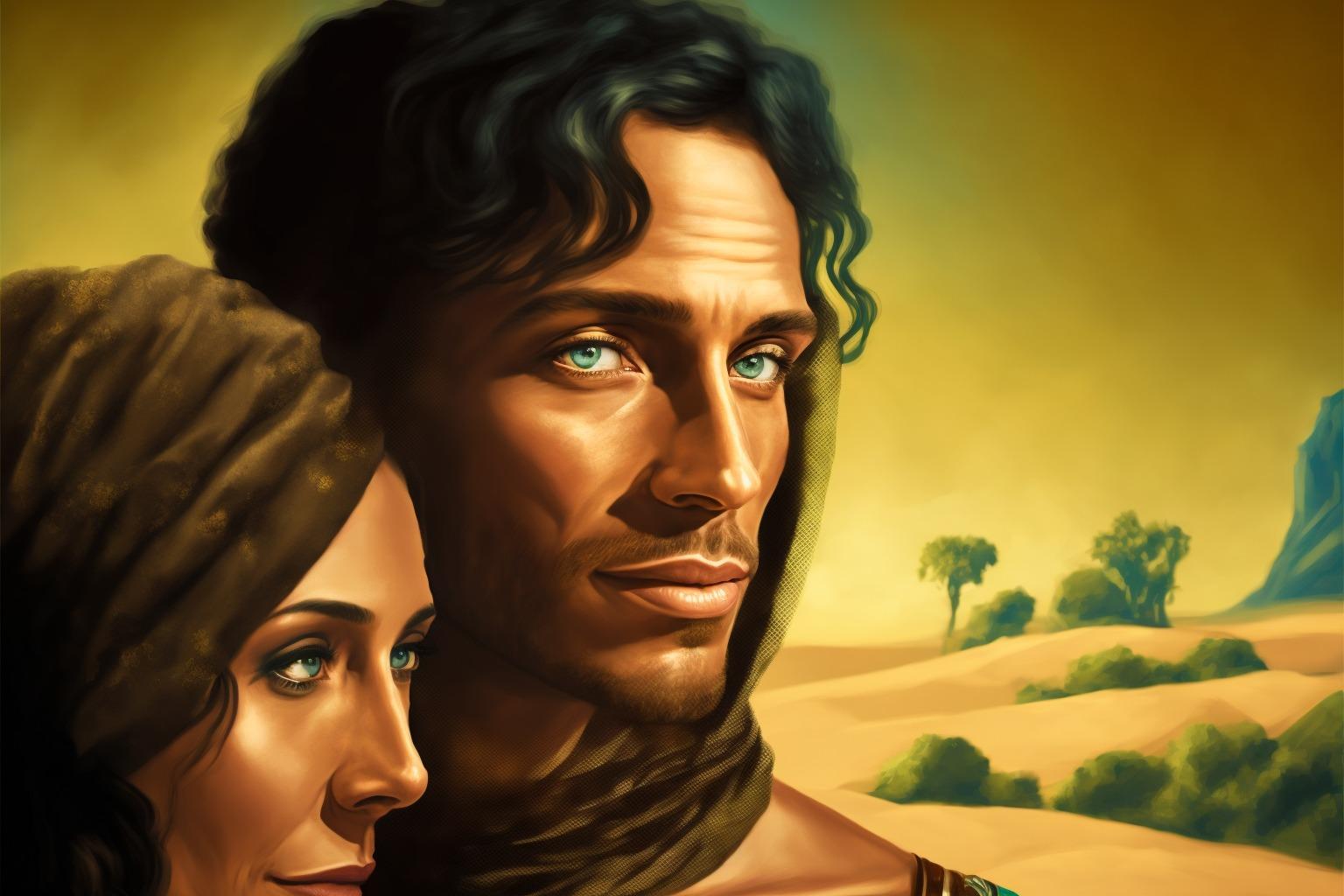 February 1, 2023 at 12:12 pm #6486
February 1, 2023 at 12:12 pm #6486In reply to: Orbs of Madjourneys
Zara took dozens of screenshots of the many etchings and drawings, as her game character paused to do the same. She had lost sight of the two figures up ahead, and remembered she probably should have been following them.
The tunnel came to a four way junction. There were drawings on the walls and floors of all of them, and a dim light coming from a distance in each. One was more brightly lit than the others, and Zara chose to explore that one first. Presently a side room appeared, with green tiles on the floor similar to the one at the mine entrance. Daylight shone though a small window, and a diagram was drawn onto the wall.
Zara toyed with the idea of simply climbing out through the window while there was still a chance to get out of the mine. She knew she was lost and would not be able to find her way out the way she came. It was tempting, but she just took a screenshot. Maybe when she looked at them later she’d be able to work out how to retrace her steps.
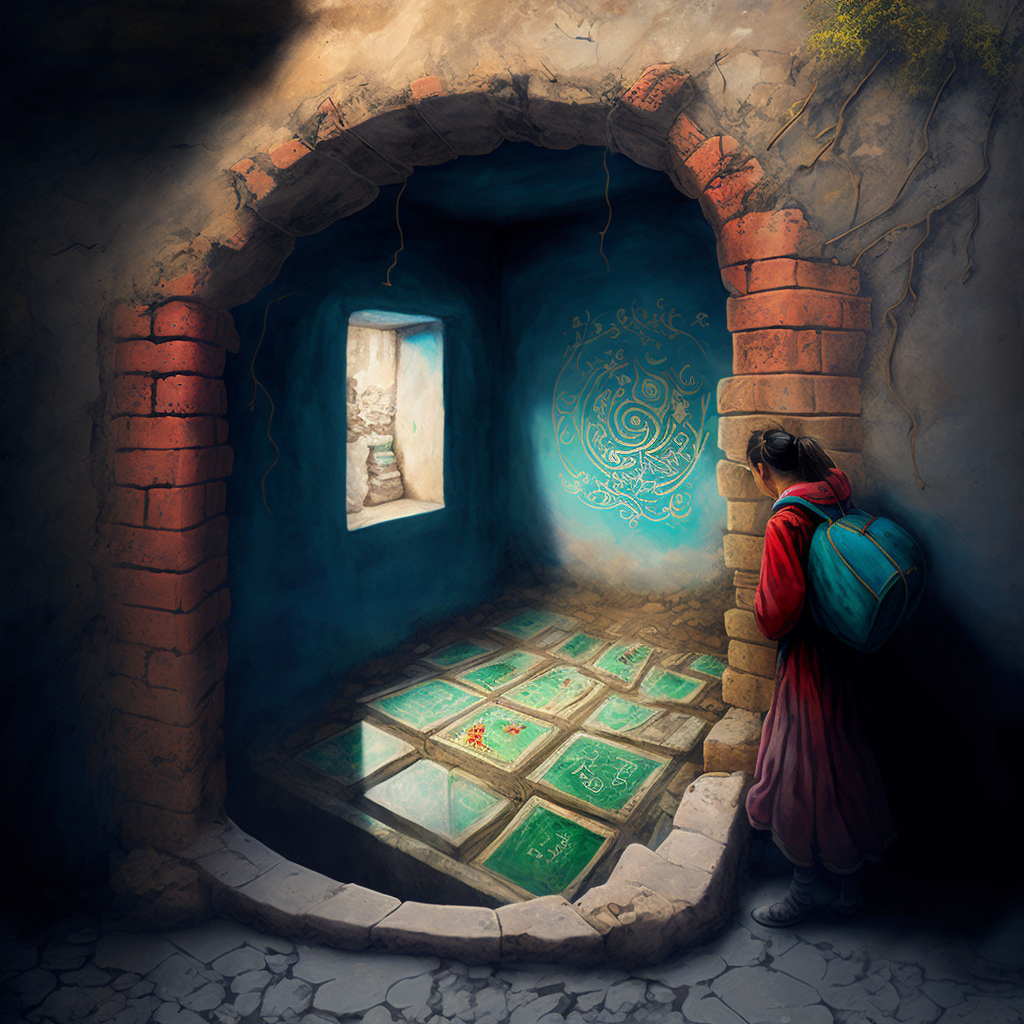
After recording the image of the room of tiles, Zara continued along the tunnel. The light shining from the little window in the tile room faded as she progressed, and she found herself once again in near darkness. She came to a fork. Both ways were equally gloomy, but a faint blue light enticed her to take the right hand tunnel.
So many forks and side tunnels, I am surely completely lost now! And not one of these supposed maps is helping, I can’t decipher any of them. Another etching on the wall caught her eye, and Zara forgot about being lost.
Zara stopped to look at what appeared to be a map on the tunnel wall, but it was unfathomable at this stage. She recorded it for future reference, and then looked around, unsure whether to continue on this path or retrace her stops back to the four way junction. And then she saw him in an alcove.
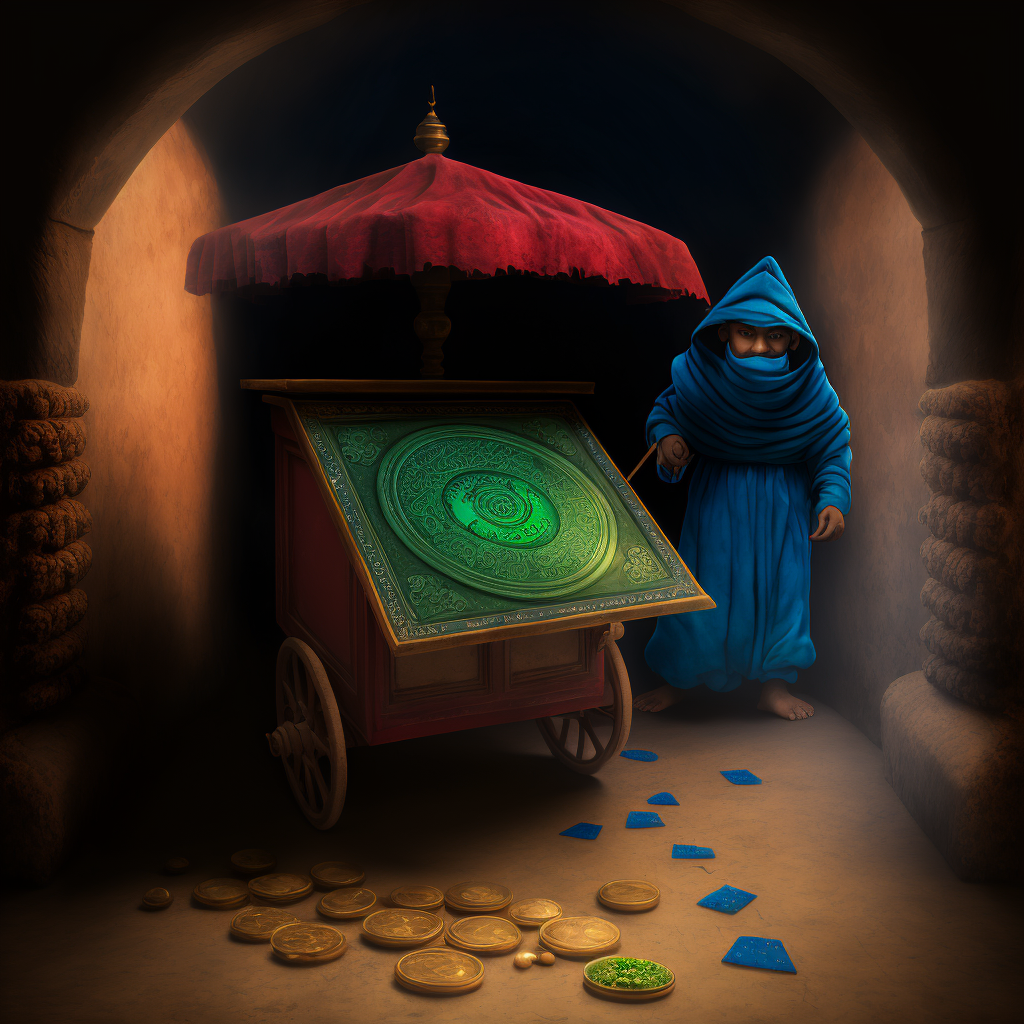
Osnas! This time Zara did say it out loud, and just as the frog faced stewardess was passing with her cart piled with used cups and cans and empty packets. I swear she just winked at me! Zara did a double take, but the cart and the woman had passed, collecting more rubbish.
With a little smile, Zara noticed that the mask Osnas was wearing was one of those paper pandemic masks. She had expected something a bit more Venice carnival when the prompt mentioned that he always wore a mask, not one of those. She hoped the clue in this case wasn’t the mask, as she had avoided the plague successfully so far and didn’t want to be late to that particular party, but the square green thing on his cart resembled the tile at the mine entrance. What do I do now though? I still don’t know what any of these things mean. Approach him and see if he speaks I suppose.
“Ladies and gentlemen, we are now approaching Alice Springs, please fasten your seatbelts and switch off all your devices ready for landing. We hope you have enjoyed your flight.”
February 1, 2023 at 9:52 am #6484In reply to: Orbs of Madjourneys
Will be at Flying Fish this evening, Hope to see you all soon!

 Congrats, Xavier!
Congrats, Xavier! 

Zara sent a message to Yasmin, Youssef and Xavier just before boarding the plane. Thankfully the plane wasn’t full and the seats next to her were unoccupied. She had a couple of hours to play the game before landing at Alice Springs.
Zara had found the tile in the entry level and had further instructions for the next stage of the game:
Zara had come across a strange and ancient looking mine. It was clear that it had been abandoned for many years, but there were still signs of activity. The entrance was blocked by a large pile of rocks, but she could see a faint light coming from within. She knew that she had to find a way in.
“Looks like I have to find another tile with a sort of map on it, Pretty Girl,” Zara spoke out loud, forgetting for a moment that the parrot wasn’t with her. She glanced up, hoping none of the other passengers had heard her. Really she would have to change that birds name!
If you encounter Osnas anywhere in the game, he may have what you seek in his vendors cart, or one of his many masks might be a clue.
A man with a mask and a vendors cart in an old mine, alrighty then, let’s have a look at this mine. Shame we’re not still in that old town. Zara remembered not to say that out loud.
Zara approached the abandoned mine cautiously. There were rocks strewn about the entrance, and a faint light inside.
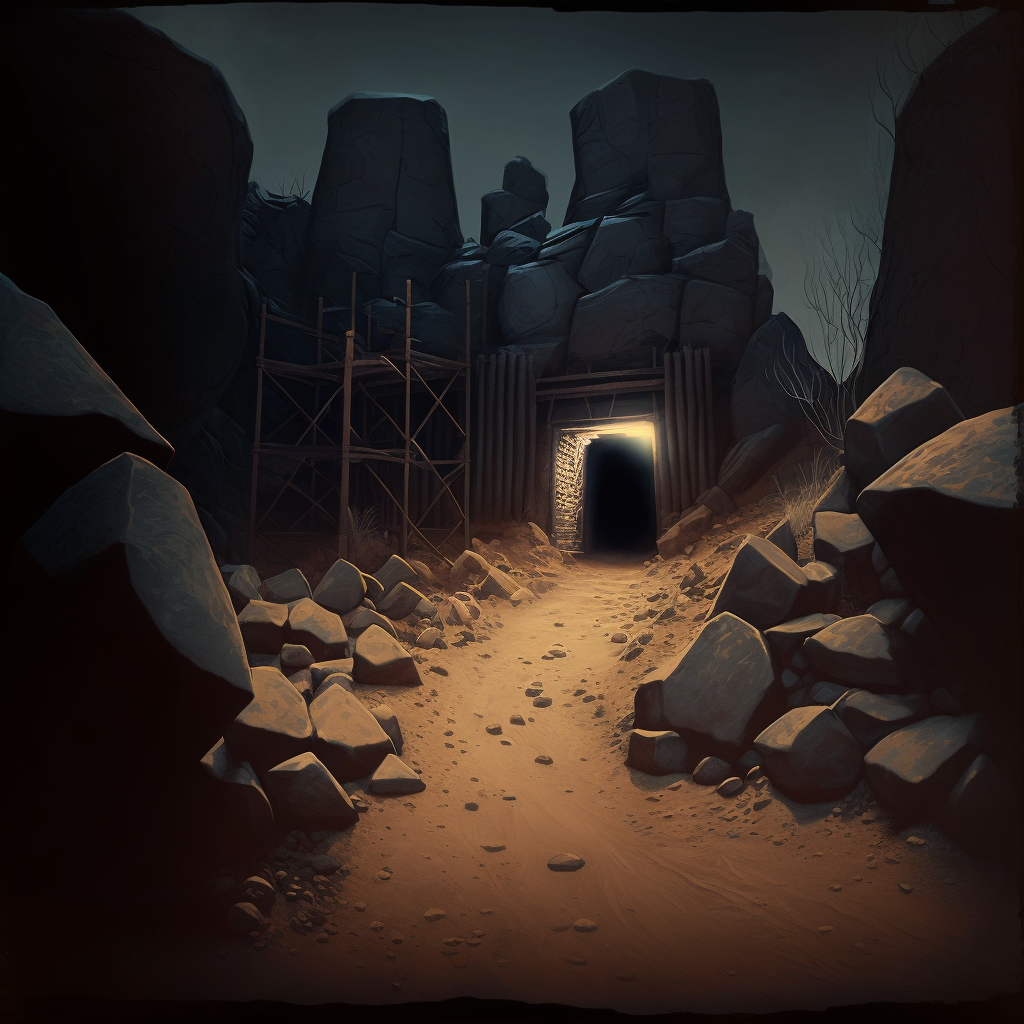
This looks a bit ominous, thought Zara, and not half as inviting as that old city. She’d had a lifelong curiosity about underground tunnels and caves, and yet felt uneasily claustrophobic inside one. She reminded herself that it was just a game, that she could break the rules, and that she could simply turn it off at any time. She carried on.
Zara stopped to look at the large green tile lying at her feet in the tunnel entrance. It was too big to carry with her so she took a photo of it for future reference. At first glance it looked more like a maze or a labyrinth than a map. The tunnel ahead was dark and she walked slowly, close to the wall.
Oh no don’t walk next to the wall! Zara recalled going down some abandoned mines with a group of friends when she was a teenager. There was water in the middle of the tunnel so she had been walking at the edge to keep her feet dry, as she followed her friend in front who had the torch. Luckily he glanced over his shoulder, and advised her to walk in the middle. “Look” he said after a few more steps, shining his torch to the left. A bottomless dark cavern fell away from the tunnel, which she would surely have fallen into.
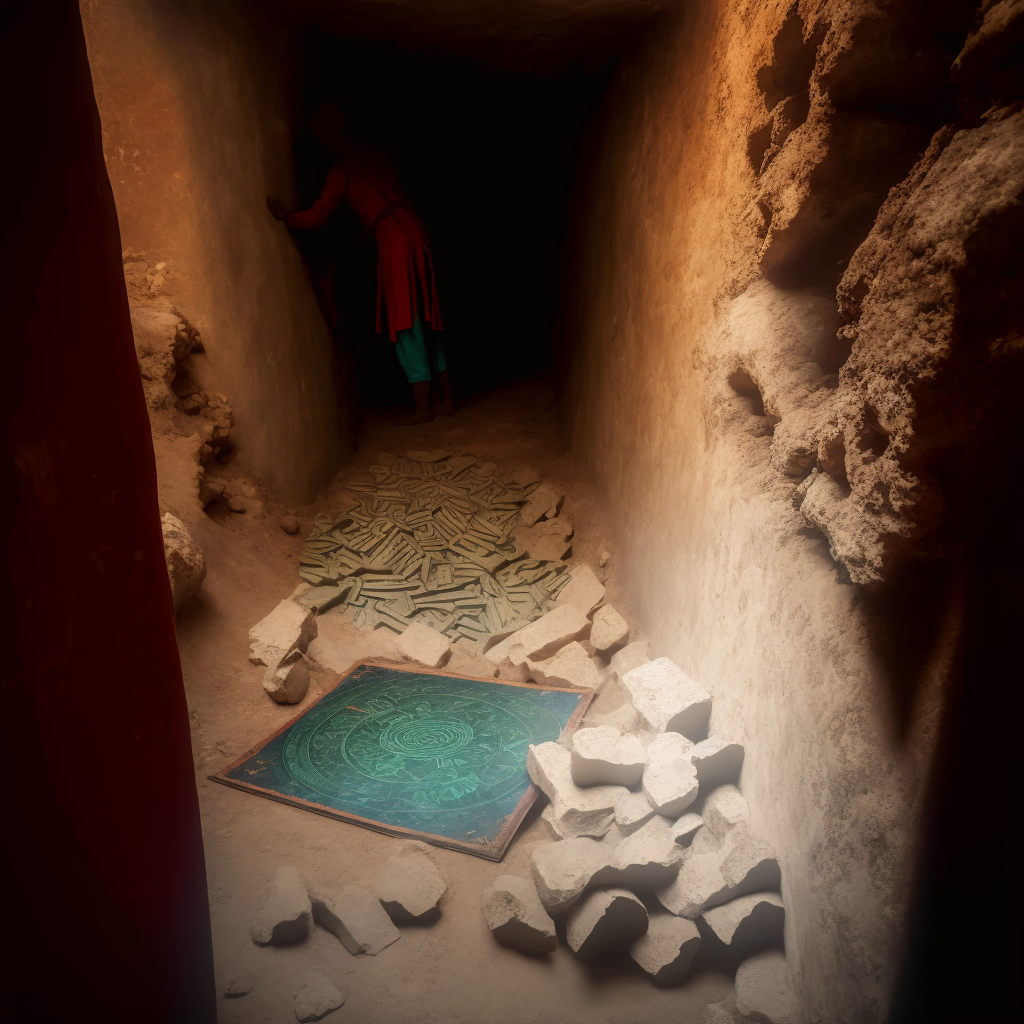
Zara moved into the middle of the tunnel and walked steadily into the darkness. Before long a side tunnel appeared with a faintly glowing ghostly light.
It looked eerie, but Zara felt obliged to follow it, as it was pitch black in every other direction. She wasn’t even sure if she could find her way out again, and she’d barely started.
The ghostly light was coming from yet another side tunnel. There were strange markings on the floor that resembled the tile at the mine entrance. Zara saw two figures up ahead, heading towards the light.
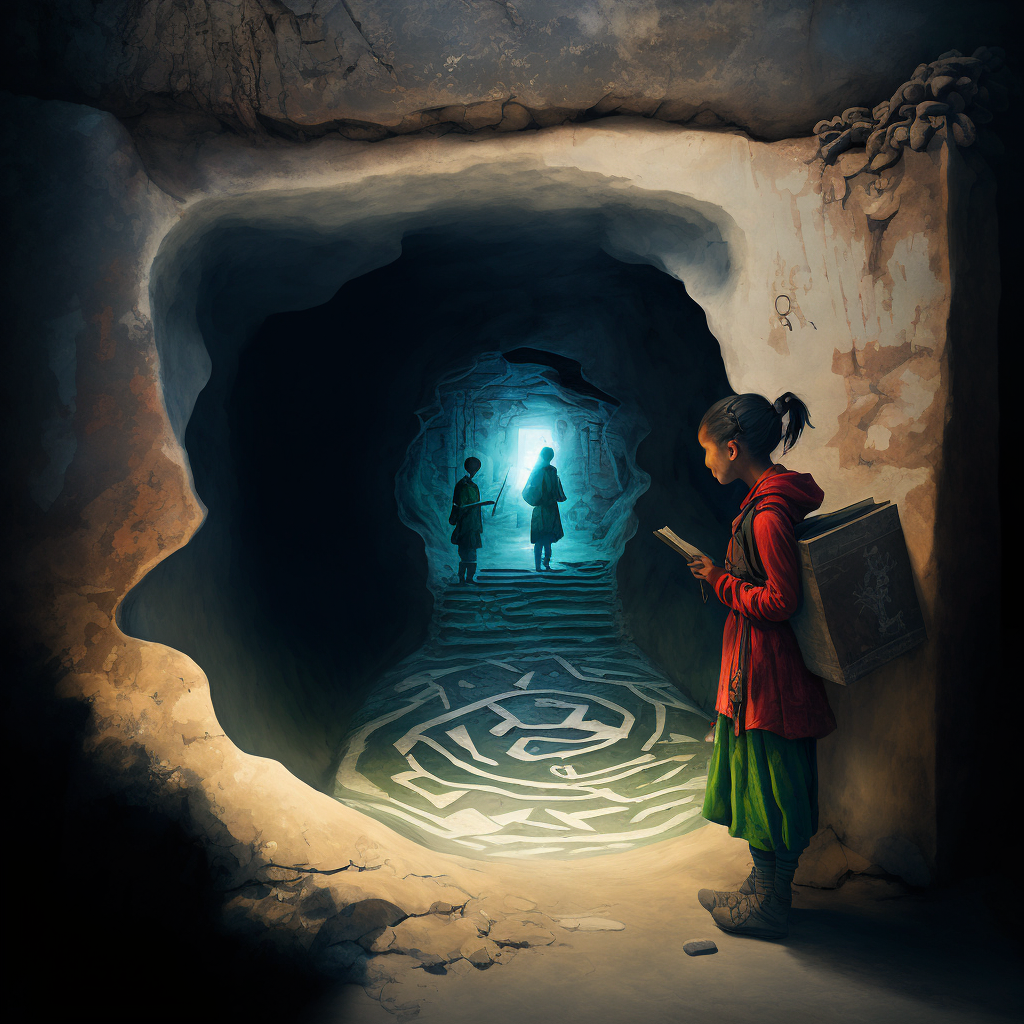 January 29, 2023 at 3:15 pm #6468
January 29, 2023 at 3:15 pm #6468In reply to: Orbs of Madjourneys
At the former Chinggis Khaan International Airport which was now called the New Ulaanbaatar International Airport, the young intern sat next to Youssef, making the seats tremble like a frail suspended bridge in the Andes. Youssef had been considering connecting to the game and start his quest to meet with his grumpy quirk, but the girl seemed pissed, almost on the brink of crying. So Youssef turned off his phone and asked her what had happened, without thinking about the consequences, and because he thought it was a nice opportunity to engage the conversation with her at last, and in doing so appear to be nice to care so that she might like him in return.
Natalie, because he had finally learned her name, started with all the bullying she had to endure from Miss Tartiflate during the trip, all the dismissal about her brilliant ideas, and how the Yeti only needed her to bring her coffee and pencils, and go fetch someone her boss needed to talk to, and how many time she would get no thanks, just a short: “you’re still here?”
After some time, Youssef even knew more about her parents and her sisters and their broken family dynamics than he would have cared to ask, even to be polite. At some point he was starting to feel grumpy and realised he hadn’t eaten since they arrived at the airport. But if he told Natalie he wanted to go get some food, she might follow him and get some too. His stomach growled like an angry bear. He stood more quickly than he wanted and his phone fell on the ground. The screen lit up and he could just catch a glimpse of a desert emoji in a notification before Natalie let out a squeal. Youssef looked around, people were glancing at him as if he might have been torturing her.
“Oh! Sorry, said Youssef. I just need to go to the bathroom before we board.”
“But the boarding is only in one hour!”
“Well I can’t wait one hour.”
“In that case I’m coming with you, I need to go there too anyway.”
“But someone needs to stay here for our bags,” said Youssef. He could have carried his own bag easily, but she had a small suitcase, a handbag and a backpack, and a few paper bags of products she bought at one of the two the duty free shops.
Natalie called Kyle and asked him to keep a close watch on her precious things. She might have been complaining about the boss, but she certainly had caught on a few traits of her.
Youssef was glad when the men’s bathroom door shut behind him and his ears could have some respite. A small Chinese business man was washing his hands at one of the sinks. He looked up at Youssef and seemed impressed by his height and muscles. The man asked for a selfie together so that he could show his friends how cool he was to have met such a big stranger in the airport bathroom. Youssef had learned it was easier to oblige them than having them follow him and insist.
When the man left, Youssef saw Natalie standing outside waiting for him. He thought it would have taken her longer. He only wanted to go get some food. Maybe if he took his time, she would go.

He remembered the game notification and turned on his phone. The icon was odd and kept shifting between four different landscapes, each barren and empty, with sand dunes stretching as far as the eye could see. One with a six legged camel was already intriguing, in the second one a strange arrowhead that seemed to be getting out of the desert sand reminded him of something that he couldn’t quite remember. The fourth one intrigued him the most, with that car in the middle of the desert and a boat coming out of a giant dune.
Still hungrumpy he nonetheless clicked on the shapeshifting icon and was taken to a new area in the game, where the ground was covered in sand and the sky was a deep orange, as if the sun was setting. He could see a mysterious figure in the distance, standing at the top of a sand dune.
The bell at the top right of the screen wobbled, signalling a message from the game. There were two. He opened the first one.
We’re excited to hear about your real-life parallel quest. It sounds like you’re getting close to uncovering the mystery of the grumpy shaman. Keep working on your blog website and keep an eye out for any clues that Xavier and the Snoot may send your way. We believe that you’re on the right path.
What on earth was that ? How did the game know about his life and the shaman at the oasis ? After the Thi Gang mess with THE BLOG he was becoming suspicious of those strange occurrences. He thought he could wonder for a long time or just enjoy the benefits. Apparently he had been granted a substantial reward in gold coins for successfully managing his first quest, along with a green potion.
He looked at his avatar who was roaming the desert with his pet bear (quite hungrumpy too). The avatar’s body was perfect, even the hands looked normal for once, but the outfit had those two silver disks that made him look like he was wearing an iron bra.

He opened the second message.
Clue unlocked It sounds like you’re in a remote location and disconnected from the game. But, your real-life experiences seem to be converging with your quest. The grumpy shaman you met at the food booth may hold the key to unlocking the next steps in the game. Remember, the desert represents your ability to adapt and navigate through difficult situations.
🏜️🧭🧙♂️ Explore the desert and see if the grumpy shaman’s clues lead you to the next steps in the game. Keep an open mind and pay attention to any symbols or clues that may help you in your quest. Remember, the desert represents your ability to adapt and navigate through difficult situations.
Youssef recalled that strange paper given by the lama shaman, was it another of the clues he needed to solve that game? He didn’t have time to think about it because a message bumped onto his screen.
“Need help? Contact me 👉”
Sands_of_time is trying to make contact : ➡️ACCEPT <> ➡️DENY ❓
January 29, 2023 at 2:30 pm #6467In reply to: Newsreel from the Rim of the Realm
“Ricardo, my dear, those new reporters are quite the catch.”
Miss Bossy Pants remarked as she handed him the printed report. “Imagine that, if you can. A preliminary report sent, even before asking, AND with useful details. It’s as though they’re a new generation with improbable traits definitely not inherited from their forebearers…”
Ricardo scanned the document, a look of intrigue on his face. “Indeed, they seem to have a knack for getting things done. I can’t help but notice that our boy Sproink omitted that Sweet Sophie had used her remote viewing skills to point out something was of interest on the Rock of Gibraltar. I wonder how much that influenced his decision to seek out Dr. Patelonus.”
Miss Bossy Pants leaned back in her chair, a sly smile creeping across her lips. “Well, don’t quote me later on this, but some level of initiative is a valuable trait in a journalist. We can’t have drones regurgitating soothing nonsense. We need real, we need grit.” She paused in mid sentence. “By the way, heard anything from Hilda & Connie? I do hope they’re getting something back from this terribly long detour in the Nordics.”
Dear Miss Bossy Pants,
I am writing to give you a preliminary report on my investigation into the strange occurrences of Barbary macaques in Cartagena, Spain.
Taking some initiative and straying from your initial instructions, I first traveled to Gibraltar to meet with Dr. Patelonus, an expert in simiantics (the study of ape languages). Dr. Patelonus provided me with valuable insights into the behavior of Barbary macaques, including their typical range and habits and what they may be after. He also mentioned that the recent reports of Barbary macaques venturing further away from their usual habitat in coastal towns like Cartagena is highly unusual, and that he suspects something else is influencing them. He mentioned chatter on the simian news netwoke, that his secretary, a lovely female gorilla by the name of Barbara was kind enough to get translated for us.
I managed to find a wifi spot to send you this report before I board the next bus to Cartagena, where I plan to collect samples and observe the local macaque population. I have spoken with several tourists in Gib’ who have reported being assaulted and having their shoes stolen by the apes. It is again, a highly unusual behaviour for Barbary macaques, who seem untempted by the food left to appease them as a distraction, and I am currently trying to find out the reason behind this.
As soon as I gather them, I will send samples collected in situ without delay to my colleague Giles Gibber at the newspaper for analysis. Hopefully, his findings will shed some light on the situation.
I will continue my investigation and keep you appraised on any new developments.
Sincerely,
Samuel Sproink
Rim of the Realm Newspaper.January 29, 2023 at 1:50 pm #6466In reply to: Orbs of Madjourneys
Xavier couldn’t help but give Glimmer a quizzical look as she’d suddenly transformed before his eyes — her accent and mannerisms shifting in an instant. She swayed lightly on her feet, in an airy manner, as if not fully aware of her surroundings, but she quickly laughed it off. “You’ve got me curious about this golden banana business, I tell ya,” she said with a twinkle in her eye.
Xavier’s suspicious expression softened as she spoke. “I’m not the one you’re looking for if you’re after information, but it sounds like a right thrilling adventure.” Glimmer grinned, “Mind if I tag along for a bit and show you around the casino boat? I know all the best games and I’ve met all sorts of pirate-talking characters here.”
With a cheeky grin, Xavier replied, “I’ll take your word for it, love.”
Glimmer’s enthusiasm for the game and eagerness to show him around the casino boat was contagious. Xavier followed her as she bounced through the crowd, pointing out different games and introducing him to the various pirate-talking characters that populated the boat.
“Watch yer back ’round ‘im,” Glimmer warned, nodding towards a tall, scruffy-looking man with a patch over one eye. ” ‘E’s a bit of a card shark, and ‘e’s known to cheat.”
As they walked, Glimmer regaled Xavier with tales of her adventures in the land and the colourful characters she had encountered. Xavier couldn’t help but feel a bit envious of her level of immersion and her enjoyment of the game.
Suddenly, the boat began to move, and Xavier realised that it was no longer anchored to the dock. Glimmer’s face lit up with excitement, “Oooh, it looks like we’re on a journey now! I’ve heard rumours of secret locations along the river that the boat takes players to. I can’t wait to see where we’re headed!”
Xavier couldn’t help but feel a sense of adventure and wonder and he followed Glimmer to the deck, watching as the boat sailed away from the dock along the river and into the unknown. He was terribly curious and looking forward to seeing where the boat would take him and what other surprises this adventure had in store.
January 28, 2023 at 11:15 am #6462In reply to: Orbs of Madjourneys

The emoji of the pirate face jumped at Xavier, as he was musing the next steps on the game. Avast ye! it seemed to hint at him, while Xavier’s thoughts were reeling from all the activity of the week. He didn’t have much time to make any progress in the Land of the Quirks game, and hardly managed to stay afloat on the stuff he had to deliver.
AL seemed to hint at a more out-of-the-box approach… Without thinking, he clicked on the emoji.
The fox bus driver indications were to follow the river until he found a junk ship moored there, which was in effect a secret floating casino. Against his best instincts, Xavimunk decided to follow the trail and after a while on the road, he could see the fully battened black sails at the horizon. Lights were glimmering in the dusk, and mist started to rise from the banks of the river. There seemed to be some unusual activity around the boat, and as Xavier arrived close, he could see a variety of quirky characters as if they were some sorts of 1920s fashionable pirates at a resort station.
The indications on the overlay screen started to shift:
*Clue unlocked*
It sounds like you’re making progress on your quest. The clues you received from the fox busdriver are definitely leading you in the right direction. Keep following the trail and don’t be afraid to ask for help if you need it. Remember, the golden banana is a metaphor for your cheeky and also soft nature, so don’t be too hard on yourself.
🦊💰🛳️ Explore the floating casino and see if the fox busdriver’s clues lead you to the golden banana. Don’t be afraid to take risks and think outside the box, as the golden banana may not be what it seems. Keep an open mind and pay attention to any symbols or clues that you come across.“Yooohoooo 👉” a message bumped on the screen.
Glimmer_Gbl is trying to make contact: ➡️ACCEPT <> ➡️DENY ❓
January 18, 2023 at 12:51 pm #6413In reply to: Orbs of Madjourneys
Zara was long overdue for some holiday time off from her job at the Bungwalley Valley animal rescue centre in New South Wales and the suggestion to meet her online friends at the intriguing sounding Flying Fish Inn to look for clues for their online game couldn’t have come at a better time. Lucky for her it wasn’t all that far, relatively speaking, although everything is far in Australia, it was closer than coming from Europe. Xavier would have a much longer trip. Zara wasn’t quite sure where exactly Yasmin was, but she knew it was somewhere in Asia. It depended on which refugee camp she was assigned to, and Zara had forgotten to ask her recently. All they had talked about was the new online game, and how confusing it all was.
The biggest mystery to Zara was why she was the leader in the game. She was always the one who was wandering off on side trips and forgetting what everyone else was up to. If the other game followers followed her lead there was no telling where they’d all end up!
“But it is just a game,” Pretty Girl, the rescue parrot interjected. Zara had known some talking parrots over the years, but never one quite like this one. Usually they repeated any nonsense that they’d heard but this one was different. She would miss it while she was away on holiday, and for a moment considered taking the talking parrot with her on the trip. If she did, she’d have to think about changing her name though, Pretty Girl wasn’t a great name but it was hard to keep thinking of names for all the rescue creatures.
After Zara had done the routine morning chores of feeding the various animals, changing the water bowls, and cleaning up the less pleasant aspects of the job, she sat down in the office room of the rescue centre with a cup of coffee and a sandwich. She was in good physical shape for 57, wiry and energetic, but her back ached at times and a sit down was welcome before the vet arrived to check on all the sick and wounded animals.
Pretty Girl flew over from the kennels, and perched outside the office room window. When the parrot had first been dropped off at the centre, they’d put her in a big cage, but in no uncertain terms Pretty Girl had told them she’d done nothing wrong and was wrongfully imprisoned and to release her at once. It was rather a shock to be addresssed by a parrot in such a way, and it was agreed between the staff and the vet to set her free and see what happened. And Pretty Girl had not flown away.
“Hey Pretty Girl, why don’t you give me some advice on this confusing new game I’m playing with my online friends?” Zara asked.
“Pretty Girl wants some of your tuna sandwich first,” replied the parrot. After Zara had obliged, the parrot continued at some surprising length.
“My advice would be to not worry too much about getting the small details right. The most important thing is to have fun and enjoy the creative process. Just give me a bit more tuna,” Pretty Girl said, before continuing.
“Remember that as a writer, you have the power to shape the story and the characters as you see fit. It’s okay to make mistakes, and it’s okay to not know everything. Allow yourself to be inspired by the world around you and let the story unfold naturally. Trust in your own creativity and don’t be afraid to take risks. And remember, it’s not the small details that make a story great, it’s the emotions and experiences that the characters go through that make it truly memorable. And always remember to feed the parrot.”
“Maybe I should take you on holiday with me after all,” Zara replied. “You really are an amazing bird, aren’t you?”
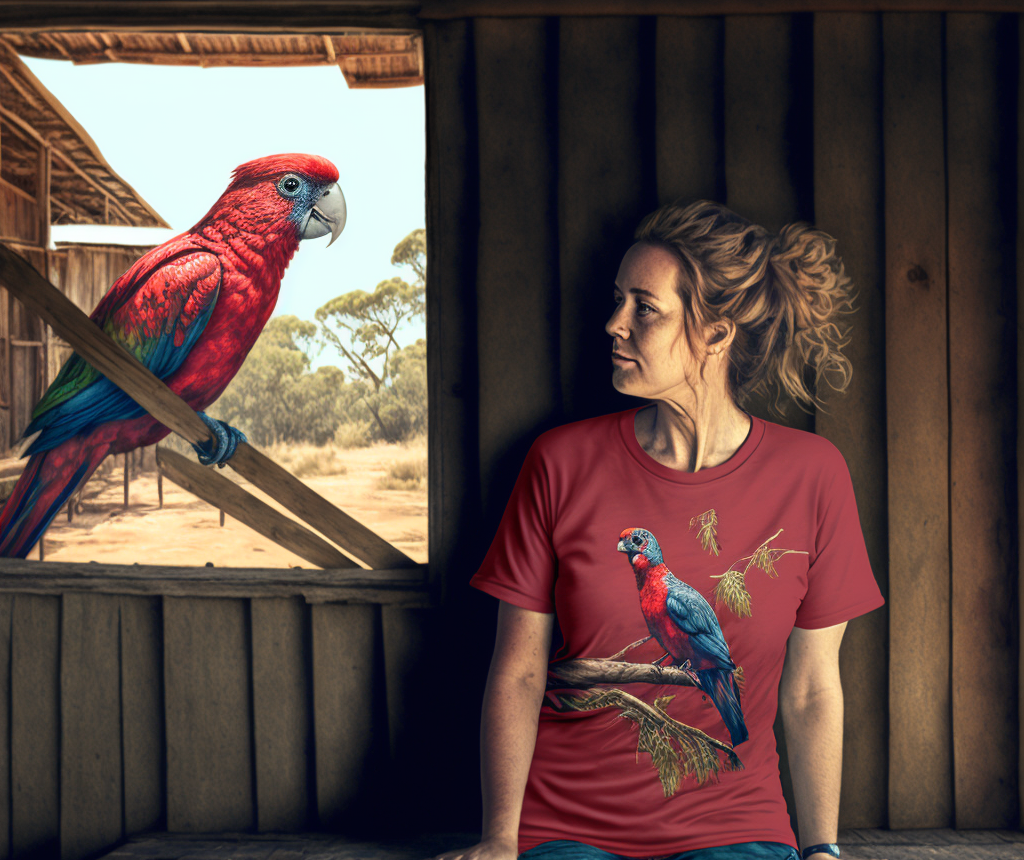
-
AuthorSearch Results